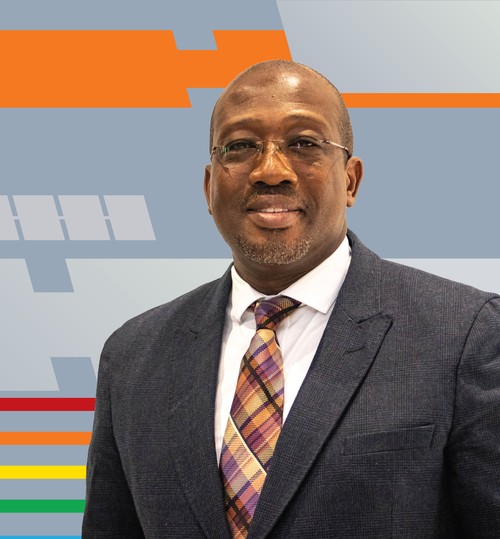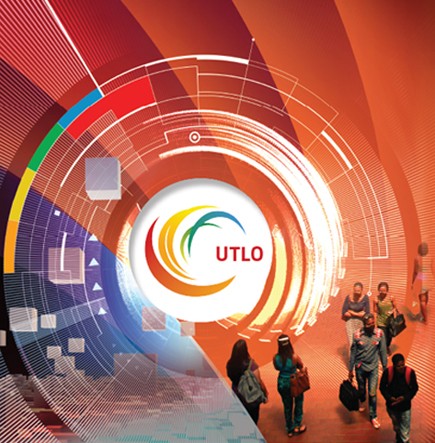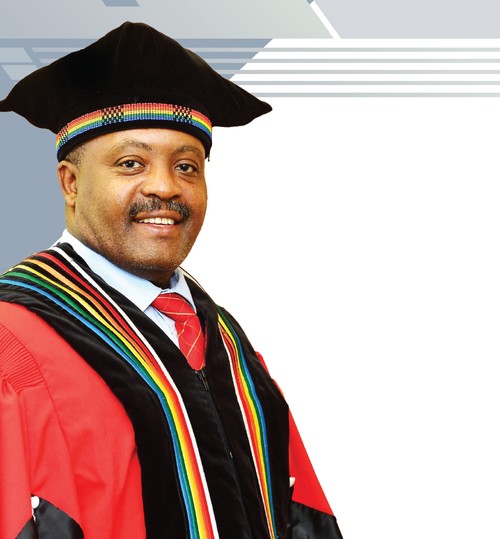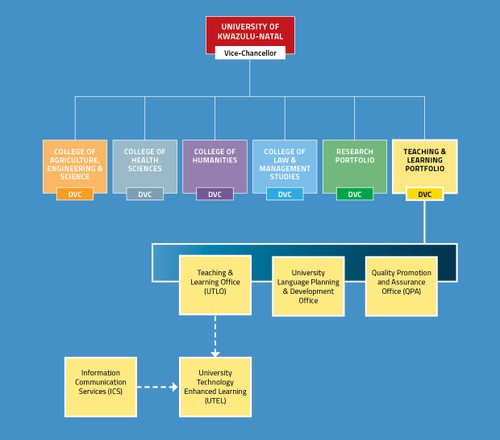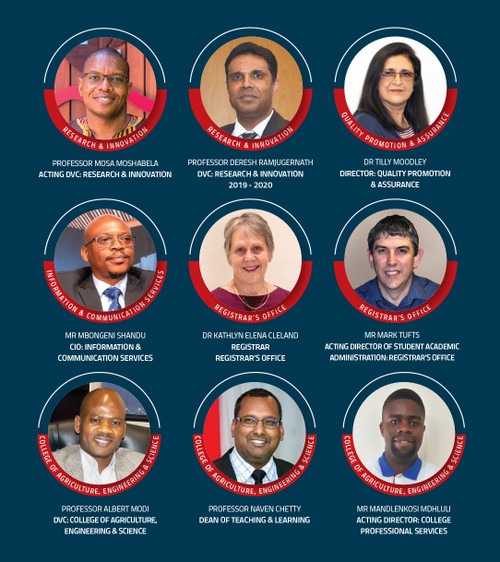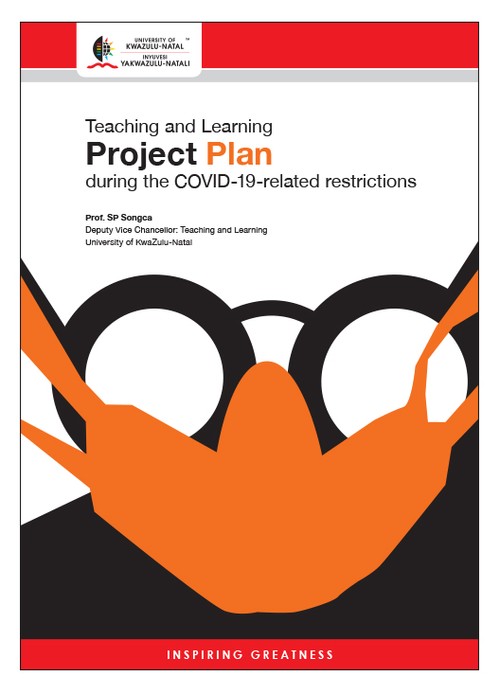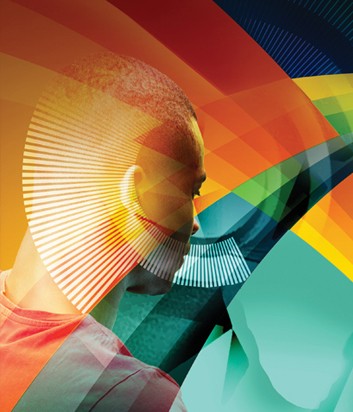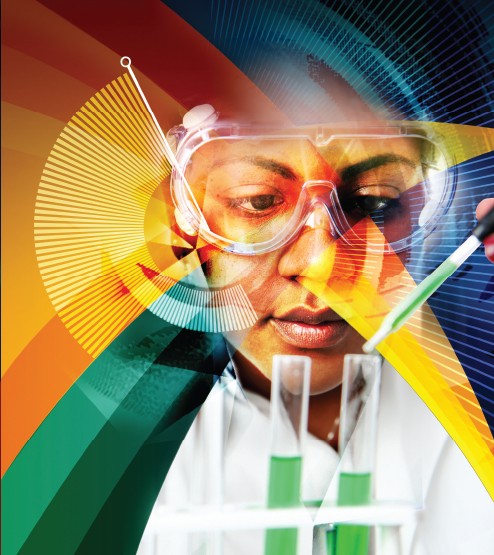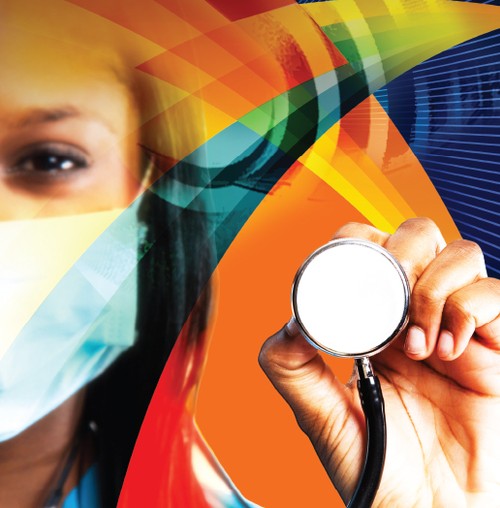UKZN’s mission is to be “a truly South African University of Choice that is academically excellent, innovative in research, entrepreneurial, and critically engaged with society”.
During 2019/2020, students and staff in the College of Health Sciences (CHS) were honoured for academic excellence, curriculum transformation and development efforts geared towards promoting innovative research and entrepreneurship, and societal and stakeholder engagement when training students in a rural setting. Numerous workshops funded by the UCDP facilitated this process. In addition, digital teaching and learning took off in the College, spurred by the onset of the COVID-19 pandemic.
Teaching and Learning Trainings/Workshop
Teaching and Learning Symposium - Innovative Best Teaching Practices
The CHS has aligned its vision to the UKZN mission, and initiated the steps required to produce healthcare professionals that are ‘fit-for-purpose’ using a Primary Health Care (PHC) model. The PHC initiative seeks to ensure that the population receives high-quality medical care; our graduates must therefore be trained in a way that equips them to meet the changing needs of societies in a developing world. The Teaching & Learning Office in the CHS is positioned to facilitate this process, as evidenced by the aptly themed 2019 Teaching and Learning Symposium – “promoting excellence in teaching and learning through innovative best teaching practices”. The Symposium also provided the ideal platform to introduce the DVC Teaching and Learning, Professor Songca, who outlined the “The UKZN Teaching and Learning Strategy” and emphasised the importance of research innovation and curriculum review.
 Symposium participants during different engagement activities
Symposium participants during different engagement activities
Critical engagement with academics in forums such as the Teaching and Learning Symposium aims to mobilise them to understand their responsibility in transforming the PHC curriculum using innovative pedagogies to produce competent graduates who are equipped with the seven core graduate competencies. The CHS DVC, Professor Ncama, challenged academics to “produce graduates who are fit-for-purpose who will use the skills imparted to them to shape the transformation and policies necessary for the fourth industrial revolution”. This sentiment was echoed by the CHS Dean of Teaching and Learning, Professor Duma, who introduced the world café where strides were made “toward a common understanding of the PHC curriculum and beyond”. Professor Ncama also stressed the importance of using innovative pedagogies and embracing the latest trends in teaching. To this end, Mr Jasper Cecil elaborated on the variety of services that UTEL provides for the development and implementation of technology enhanced teaching and learning.
The afternoon session of the symposium comprised seven oral presentations by CHS staff.
- Professor GHM Vawda, Director: Community Health and Indigent Programme Services, shared his three decades of experience and philosophy in a presentation titled “Policies and Best Practices in Education.". With a ‘heterogeneous’ blend of student demographics in South Africa, the majority are drawn from a severely disadvantaged background with extremely poor preparedness for tertiary education, which presents challenges for both educator and student. The presentation outlined Prof Vawda’s philosophy of tertiary education in terms of identification and description of student learning experiences which are categorised into four phases, based on the chronology as a lifelong learner. These are the “Embryonic Phase”, the “Adolescent Phase”, the “Mature Phase” and the “Geriatric Phase”. Prof Vawda proposed physical and psychological strategies in teaching and concluded that the best practice in education is the “Compassion and Identity Factor”. If a teacher is compassionate towards students, not only will discipline prevail in the class, but effective rapport will be developed between the student and teacher, obviating the problem of “them and us”. He also suggested a number of ways the educator can be deeply committed to teaching, empowerment and upgrading of the student.
- An academic staff team which included Dr S Mahomed, Dr DM Jorgensen, Prof I Mackraj, and Dr C Blewett presented their plans to develop and roll out an innovative online plagiarism workshop for students. The development of this online workshop was a combined effort of this multidisciplinary team, including experts in the use of digital pedagogies. Some of the areas of the workshop include an understanding of what constitutes plagiarism and the different types thereof, how to avoid plagiarism, and its consequences.
- Dr K Naidoo from the School of Nursing and Public Health presented the findings from a self-administered questionnaire evaluation of a six-week Integrated Primary Care module for fourth-year medical students. This module adopted a blended learning approach within a service learning model with the explicit objective of sensitising students to inter-professional education and collaboration. In general, it was positively received by students, leading to the conclusion that service learning using blended learning is effective in achieving learning objectives in primary care, as well as positively influencing student attitudes towards inter-professional education.
- Dr D Naidoo, Professor J van Wyk, and Dr R Dhunpath presented their qualitative research study which explored the views and experiences of a group of final-year occupational therapy students and their supervisors through semi-structured interviews and focus group discussions on service learning pedagogies to promote student learning. The study revealed the views of supervisors and students on strategies that facilitated and hindered learning. These included setting clear guidelines, collaborative peer assisted learning, and scaffolding learning experiences.
- Professor M Pillay and Dr P Flack from the Discipline of Speech Language Pathology discussed “inter-professional education-through-practice (IPE)” in a resource constrained community in KwaZulu-Natal which is part of UKZN’s Decentralised Clinical Training Platform. Panellists, which included academics and students from UKZN and the University of Zululand, aimed to develop a College-wide discussion on how to work more meaningfully at a community and home level. They offered their insights on community based health care, to engage the CHS in a discussion on IPE pedagogy, curriculum and administration.
- Given insufficient knowledge of cervical cancer and HPV vaccination, an educational simulation learning package for undergraduate student nurses was developed and evaluated by JA Olaboye (student) and Dr DL Wentzel. It was found that the role-play simulation encouraged active learning and enhanced the acquisition of practical skills among student nurses in training. VII Health advocacy is one of the seven core graduate competencies. Initial data from a study conducted by Prof Duma, Dr Gaede, Dr Wallace, Dr Christopher and Ms Khan-Gilmore suggested limited teaching and assessment of health advocacy in the Health Sciences undergraduate curriculum. However, ‘changing the lens’ revealed themes where health advocacy could be taught and assessed, and used as a “vehicle to promote inter-professional education and practice in the CHS”.
UTLO Workshop Series
 Professor Remigijus Bubnys
Professor Remigijus Bubnys
In 2019, the UTLO hosted a series of workshops facilitated by Professor Remigijus Bubnys of Šiauliai University, Lithuania. Funded by a UCDP grant, its overarching theme was “Reflective learning models and practices”. During the teaching sessions, Prof Bubnys focused on prospects for lifelong learning, reflective practice, reflective learning, allied models and interrelations between experience, learning and reflection. Reflective learning was explored as a concept and continuous educational process in the training of specialists at higher education institutions. The main models of reflective learning, and their attendant training peculiarities, problems and opportunities for future specialists were interrogated. He also reflected on structural elements of reflective learning, including theoretical and practical aspects. This workshop was attended by teaching staff across UKZN Colleges.
Curriculum Transformation and Development
The School of Laboratory Medicine and Medical Science (SLLMS) currently offers three-year undergraduate programmes in Anatomy and Physiology, respectively. In 2018, the SLMMS initiated discussions on whether these programmes met industry and stakeholder standards, and how they impacted on the employability of graduating students. Staff, students and other stakeholders, including industry were engaged in workshops and surveys, a year-long process that culminated in the redesign of the three-year Bachelor of Medical Science Programme into a four-year programme to ensure that it meets industry and stakeholder standards.
The new Bachelor of Medical Science Programme aims to address the critical shortage of expertise and skills in innovation and entrepreneurship and is in line with the Department of Science and Technology (DST) updated policy that highlights the need for a shift in the science and technology sector towards a business-led innovation approach to improve the economy. The concept note for the proposed four-year undergraduate programme was approved by the College Academic Affairs Board (CAAB) in 2019, and a process of programme and module template completion was initiated for submission to the CHE. The new programme will be offered for the first time in 2022. The Dean of the SLMMS, Professor Mabandla expressed his gratitude to all staff for the contributions made; “Through your enthusiasm, dedication and willingness to embrace change, we have an opportunity to change the teaching and learning landscape not only for our School but also the University as a whole.”
The Academic Leaders of Teaching and Learning in the School of Clinical Medicine (SCM) and School of Nursing and Public Health (SNPH) hosted a workshop on re-aligning the MBChB programme. The development and implementation of a community-based, primary care focused curriculum was one of the recommendations from the HPCSA accreditation committee in 2018. Professor Lionel Green-Thompson, Dean of Sefako Makgatho Health Sciences University drew on his extensive experience in medical education and involvement in developing and supporting curricula that are fit for purpose to facilitate this workshop.
 Professor Lionel Green-Thompson
Professor Lionel Green-Thompson
Curriculum transformation was facilitated by UCDP funding for the completion of successful workshops in the School of Health Sciences (SHS). According to the academic leader in the School, Dr Diane van Staden: “These were mostly just exploratory, so there is much more work to be done to effect real change in the curricula of our programmes. In principle, the need for transformation is appreciated.” UCDP funding was also used for teaching assistants for bottleneck modules in the SLMMS and to fund mentors in the SHS. Sixteen teaching assistants were available to assist and mentor struggling students in the 2019 – 2020 academic year. They were particularly helpful during the COVID-19 lockdown and contributed to a significant improvement in pass rates for these modules.
Clinical Supervision Workshop
 Professor Carol Falender (front right) with colleagues from UKZN’s Department of Behavioural Medicine.
Professor Carol Falender (front right) with colleagues from UKZN’s Department of Behavioural Medicine.
Clinical supervision is the foundation of clinical training and practice, with recognition slowly growing that it is a distinct professional practice. While task forces have recently defined requisite competencies and guidelines for supervision practice, research shows that training and competence in clinical supervision are lagging behind as there is inadequate recognition of the substantial changes that have occurred. UKZN’s Department of Behavioural Medicine, in collaboration with the KwaZulu-Natal branches of the South African Society for Clinical Psychology, Psychological Society of South Africa, and the Durban Practising Psychologists Group (DPPG) hosted a workshop (facilitated by Professor Carol Falender) on clinical supervision on the Howard College campus. It was designed to provide the most current skills to enhance ethical multicultural supervision practice, including multicultural diversity; supervision competencies; supervision guidelines; best practices; supervisory relationship, strains, ruptures, and repair; reflective practice; assessment; feedback and evaluation strategies; legal and ethical frameworks; and self-care. Prof Falender is the co-author of Supervision Essentials for the Practice of Competency Based Supervision (APA, 2017) and four other books on clinical supervision.
Laboratory Construction/Refurbishment
Two undergraduate laboratory refurbishment projects were planned for the SLMMS in 2019. Phase 1 of the refurbishment of the undergraduate laboratories in the Discipline of Physiology on the Westville campus took much longer than anticipated, but staff ensured minimal disruption to the practical timetable. The refurbishment of the Medical School Laboratory was completed in 2019, and was ready for use in 2020. The 157-seater laboratory is equipped with 50 monitors. Training on the use of the audio-visual equipment in the laboratory was conducted by ICS.
The Physiology Laboratories on Westville campus (A) and multi-user, multi-purpose laboratory at the Nelson R Mandela School of Medicine (NRMSM) (B) were refurbished in the 2019-2020 academic year.
 Figure 21. Before and after refurbishment of Medical School laboratory
Figure 21. Before and after refurbishment of Medical School laboratory
Online Learning
According to Professor Nirmala Gopal, UKZN has experienced a “major transformation in the way we teach and learn” that “has been triggered and fast-tracked by COVID-19”. Indeed, it was necessary to move all content online, a practice that saw academic leaders scrambling to ensure that module templates were adapted for online learning. In the SHS, the clinical teaching approach was forced to adapt to a virtual space. The use of simulation as a tool for clinical teaching was adopted by a few disciplines following lockdown. Most disciplines have adopted a blended learning approach to teaching. Academics have also started using Moodle functionalities more broadly, where previously it was mainly used as a repository for course material. This student-centred online platform was adopted by the SLMMS and NRMSM. There is growing engagement on the scholarship of teaching and learning among academics, and several teaching and learning research projects are underway across the Colleges.
Student Support Services Report
In the past year, the Student Support Services team, in collaboration with CHS Schools, worked tirelessly to ensure a smooth transition to online learning. The pandemic posed many challenges to students over and above unfamiliar online learning, and included issues such as the decline in mental health, content accessibility and a conducive study space. Student Support Services extended its support to address some of these challenges among specific student groups; such as the phased return of students during lockdown; at risk students; students presenting in crisis and trauma; and those requiring psychotherapy and psychoeducation. The ADOs played a pivotal role in identifying the key problem areas and referred students to Student Support Services where necessary.
A number of programmes were developed to improve students’ experience and ease the transition to online learning. They included the ‘Leaving no student behind initiative’ aimed at resolving connectivity issues. Despite continued efforts to resolve these challenges, connectivity challenges linger. Other programmes included the peer wellness mentorship programme, re-integration and re-orientation of returning students, psychoeducation using infographics and audio, telehealth support interventions, and the UKZN Student Support Services toll free line and email to book appointments for students who needed support.
Awards and Achievements
Excellence in Teaching Awards for CHS Academics
Three academics were recognised by the CHS Teaching & Learning Office for the Teaching Excellence award, namely Dr Bernard Gaede, Prof Timothy Hardcastle and Prof Verusia Chetty. Dr Gaede was honoured for his contribution to promoting the Decentralised Clinical Training Platform.
Blended Learning Study Scoops Award at Research Day (2019)
Undergraduate students in the SHS had the opportunity to present their research at the School’s Research Day. First prize was awarded to Audiology students, Ms Tersia Erasmus, Ms Nomali Jali, Ms Pamela Mthiyane and Ms Shanique Ronne for their presentation: Audiology and Speech Language Therapy Students’ Attitudes and Perceptions towards Blended Learning at the University of KwaZulu-Natal.
The winning study involved 170 second- to fourth-year students of which 74% had access to the Internet off-campus and 84% of this number used it to study. The results revealed that students in advanced years of study, including third- and fourth-years, had a more positive attitude to blended learning than second-years who preferred face-to-face contact. Overall, the participants display a positive attitude and perceptions towards blended learning despite the challenges of internet access off-campus, connectivity issues and insufficient training. Blended learning was found to improve students’ skills, enhance learning experiences and foster a student-centred approach to teaching and learning.
 Top, from left: Dr Bernard Gaede, Professor Timothy Hardcastle and Professor Verusia Chetty. Left: The winning Audiology team.
Top, from left: Dr Bernard Gaede, Professor Timothy Hardcastle and Professor Verusia Chetty. Left: The winning Audiology team.
These are reassuring findings as the CHS has adopted this pedagogy in implementing online teaching. The students were commended for excellence in their study design and execution by one of the adjudicators, Mr Ntsikelelo Pefile: “You have contributed to curriculum development and produced novel, innovative studies. Congratulations to you all.”
CHS Celebrates Improved Pass Rate of Registrars
The CHS hosted the second Registrar Awards Evening at Umhlanga to honour specialists who successfully completed their final clinical examinations with the Colleges of Medicine of SA (CMSA), sub-specialists and those who graduated with Masters in Medicine (MMED) degrees. The College saw an improvement in the pass rates of registrars from 43% in 2018 to 66% and 57% in the first and second semesters of 2019, respectively with a 70% pass rate in the second semester sub-specialty examinations. The CHS also graduated 96 specialists with Masters in Medicine degrees (MMED) in 2019. “This is an achievement to be celebrated,” said the Leader of the Registrar Training Programme, Dr Suvira Ramlall.
 Staff and students at the award ceremony
Staff and students at the award ceremony
Top Achievers Honoured for their Academic Achievement
CHS top achievers (47 recipients in total) were granted scholarships in 11 categories, illustrating the attainment of UKZN’s vision to be the “Premier University of African Scholarship”. PhD student in the School of Nursing and Public Health, Ms Boitumelo Setlhare, was awarded the Talent Excellence and Equity Acceleration Scholarship. This scholarship is awarded to students intending to pursue an academic career at UKZN. Derived from the University’s own funds, it enables UKZN to identify potential top academic talent to grow the next generation of academics.
Ms Sange Matebese, recipient of a UKZN Prestige Sports Scholarship, plays touch rugby for the KZN U19 Girls team as well as the KZN Ladies team. She has also represented South Africa, playing for the SA U18 Ladies team. “I feel very honoured and privileged to have the opportunity to study further in a field I am so passionate about,” she said.
Fifth-year Medical student, Mr Kapil Narain, was awarded the Abe Bailey Travel Bursary, which will enable him to hone his skills overseas. According to the Trust’s website, “The focus of the bursary is leadership development and the Trustees wish the bursaries to be awarded to students who are academically strong and have shown exceptional qualities of leadership and service, with a good track record not only on the campus level but also in a wider community.”
First-year Bachelor of Medicine and Bachelor of Surgery (MBChB) students at the NRMSM received scholarships in four categories. Thirty female first-year Medical students were elated recipients of the Frene Ginwala Scholarship, an entrant equity award that supports top African female entrants to the University in all disciplines. The prestigious Pius Langa Scholarship awarded to undergraduate students ranked in the top 10 in the KwaZulu-Natal Education Department’s National Senior Certificate (NSC) examinations or those that achieved the best results in the national Independent Examinations Board matriculation examinations was awarded to Mr Eveshan Pillay, Miss Tiniel Gerald and Mr Adnan Bassa. Mr Mohamed Saib and Miss Courtney Vlassides were two of five top-ranked undergraduates proceeding from first to second year having obtained 80% on a normal full-year subject load; they were recipients of the prestigious College DVC’s Scholarship. Mr Simphiwe Xaba, Miss Michelle Nompilo Putini and Miss Maseeha Ismail Bhorat were awarded the Malegapuru W Makgoba Scholarship. The scholarship is bestowed on the five top-ranked undergraduates proceeding from their first to second year of study in each of UKZN’s four Colleges.
Ms Emily Ruth Higgitt from the SLMMS was also a recipient of the Malegapuru W Makgoba Scholarship. Also hailing from the SLMMS, Miss Tumelo Mzenda and Mr Ugochukwu Anyaneji, received Archbishop Denis E Hurley Awards. ‘Hurley Scholars’ are meritorious academic performers with exceptional leadership qualities and an ethical vision for society, who are involved in community service.
Bachelor of Pharmacy students received scholarships in three categories. Ms Azra H Paruk, received the Townley Williams Scholarship in her final year of study, after having also received the Malegapuru W Makgoba Scholarship in the second year of her BPharm degree (2017), while Ms Amina Jhazbhay, received the Lawrence and Constance Robinson Scholarship and Ms Fathima Rajah was the recipient of the 50th Anniversary Endowment Fund Scholarship for outstanding academic achievement.
Family Medicine Focuses on Social Return on Investment
Dr Torres Wooley of James Cook University in north-eastern Australia is an evaluation expert and a member of the Training for Health Equity Network (THENet), a network of individuals and institutions that aims to mobilise universities that train health professionals towards community engagement and socially accountable health workforce education. However, “Many initiatives launched by socially accountable institutions of higher learning remain at the level of discreet projects,” said Wooley. UKZN’s Centre for Rural Health has formally partnered with THENet to promote and research social accountability and community-engaged health professional education, in order to fulfil the third imperative of the White Paper on Higher Education, for higher education institutions to be involved in community engagement. This motivated successful implementation of the rural block of the medical programme where students have an option to live in the community, rather than using hospital-based accommodation. It is part of a larger exploration of how to strengthen community engagement at UKZN.
 Above, from left: Family medicine professionals Dr Torres Wooley with Dr Bernhard Gaede. Global Shapers, from left: Mr Clement Agoni; Sister Zwane, Senior Nurse at Umlazi U21 Clinic; Dr Thandeka Maphumulo, Medical Doctor Health Team Co-lead; and Ms Nomfanelo Dlomo, Deputy Curator of the Durban Hub.
Above, from left: Family medicine professionals Dr Torres Wooley with Dr Bernhard Gaede. Global Shapers, from left: Mr Clement Agoni; Sister Zwane, Senior Nurse at Umlazi U21 Clinic; Dr Thandeka Maphumulo, Medical Doctor Health Team Co-lead; and Ms Nomfanelo Dlomo, Deputy Curator of the Durban Hub.
According to the Head of the Department of Family Medicine, Dr Bernhard Gaede, “Anecdotally, such an approach has a major impact on the host families and the wider community. However, besides the more strategic and conceptual questions regarding how this is incorporated into the mission of the Institution, a critical question focuses on how we can assess and evaluate this. Critical in the approach is that both the unintended consequences of the intervention as well as less tangible effects (such as increased empathy) are included and costed.” Academics and postgraduate students in the CHS attended a talk on how to evaluate the social return on this investment by Wooley who shared details on how to design such.
Global Shapers of UKZN Spearhead Health Awareness Drive
In accordance with UKZN’s commitment to achieving excellence through our core function as a knowledge agent, as well as through our engagement with communities, Global Shapers of UKZN spearheaded a Health Awareness Drive in 2019. Mr Clement Agoni, a Pharmaceutical Chemistry PhD student and Medical School alumnus, Dr Thandeka Maphulo, led the drive, which attracted more than 300 participants. eThekwini Municipality, the South African National Blood Services, Marie Stopes, Pink Drive, the Merebank Clinic, Umndeni Skincare Petroleum Jelly, and Lancet Laboratories were among the many non-profit organisations that volunteered their services. These included cervical cancer and breast cancer screening, blood sugar tests for diabetes, sexual health education, HIV screening and general medical consultations. The event raised awareness of prevalent but preventable health conditions.
UKZN Medical School Class of ’69 Holds 50-Year Reunion
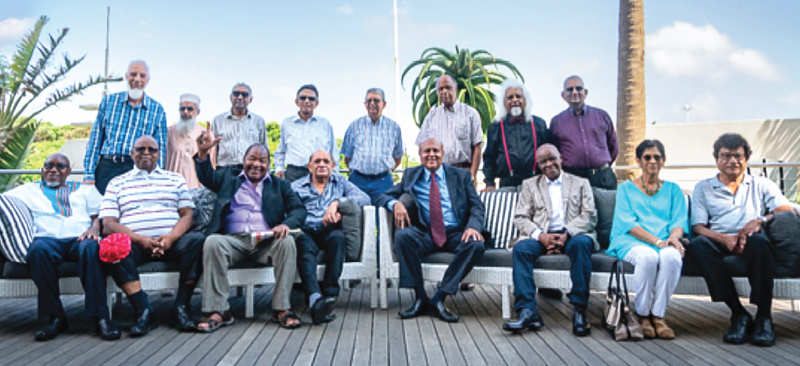 Above: Attendees at 50-year reunion.
Above: Attendees at 50-year reunion.
The reunion of the UKZN Medical School class of 1969 was filled with emotion and reminiscence of times past, as many of those in attendance had not seen each other for 50 years. They marvelled at the changes implemented at the Medical School – now known as the Nelson R Mandela School of Medicine – but also at how many things remained the same. Many of the doctors are still in practice, including Drs Farouk Haffejee, Ahmed Salejee, Percy Naidoo, Rajend Maharaj, Titus Moghoro, Bala Naidoo, Les Ananth, Steve Ramasuvha, Thomas Rambau, Simon Khoza, Chandracant Manga, Pilisa Shweni and Krish Thangavelu. The doctors recalled the struggles they faced as students during the apartheid era, which enforced laws that limited the movement and practice of African, Indian and Coloured doctors. Many young doctors had their dreams of specialising shattered because of the limitations on movement and access to posts which were often in Whites-only hospitals. The outlook for our current MBChB students is different in the democratic era, and with UKZN’s strategic plan which promotes transformation and diversity: “In its pursuit to be the Premier University of African Scholarship, UKZN delivers on the dual imperatives of quality and transformation. By its nature, a transformative university that places people first, and which nurtures and develops academic talent and diversity among its students and staff, UKZN aspires to a value-driven service culture that inspires greatness across the Institution, in its partners, and in the stakeholder communities it serves.”
